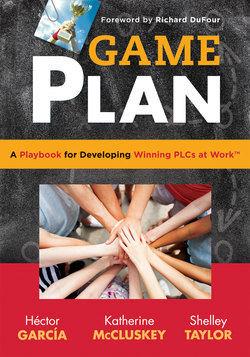Читать книгу Game Plan - Hector Garcia - Страница 7
На сайте Литреса книга снята с продажи.
ОглавлениеPreface
Game planning has always been associated with sports, yet today the phrase has become ubiquitous with being well prepared and having a strategic plan for success. In every level of athletic competition, highly effective coaches synthesize their philosophy and expectations into a game plan. In essence, they solidify the most critical components into something tangible and easy to follow. Just as with any sports team, a winning season for schools also starts with the development of a game plan and a playbook.
Many leaders ponder the question of what holds teams back, and, as a Professional Learning Communities (PLC) at Work™ consultant who speaks across the country and has been a part of nationally recognized schools, Héctor García has found an interesting pattern. The schools that struggle to move forward are unable to translate their enthusiasm into a systematic plan of action with a process for monitoring their progress along the journey, and they quickly become distracted by a new initiative or concept. Schools that consistently make progress are not only enthusiastic about the work but are also methodical about developing a game plan, ensuring that it is deeply embedded in the culture and behaviors of the staff, and guaranteeing that everyone has the necessary guidance to implement the new vision.
The concept of winning is pervasive and highly celebrated both in sports and in a PLC culture. To further illustrate our position, we provide the following brief examples of how the characteristics and actions of successful sports teams are similarly aligned to those of PLCs.
• In sports, like in education, individuals can operate in quasi-isolation pursuing different goals, or they can work interdependently and focus on a compelling task or vision. The teams that are purposeful and deliberate about establishing and executing a plan of action seem to win much more often than those who believe in stumbling upon success.
• Focusing on developing and coaching all players results in higher achievements than investing only in star players or waiting until the top recruits come to campus all at once.
• While individual superstars on a team have tried many times to win championships, few success stories come to mind. Yet, there is a litany of average players who have come together and won championships even against overwhelming odds.
• A clear commitment to collaboration, respect, and hard work will start to produce the sort of culture that is needed to become a champion.
• Coaching requires insightful and deliberate leadership, not just an expectation that great players will intuitively know how to become a championship team.
• Game plans are never developed overnight or quickly put together. A winning strategy must evolve from guided discussions, various perspectives, deliberate action, and most importantly a guiding coalition.
It is our hope that this book will help leadership teams at both ends of the spectrum prepare a game plan to develop the level of clarity and focus that is essential in schools, whether their schools are well organized and poised to become elite educational systems with one or two additional elements of effectiveness or just starting the journey of becoming a professional learning community and need a more comprehensive approach. We know that some readers will utilize the resources we have provided simply as they are presented, while more seasoned veterans might use them to challenge their current practices and assumptions. In either case, the book is meant to offer guidance and spur meaningful discussions on the journey to success.
We look forward to contributing to your game plan for success!
